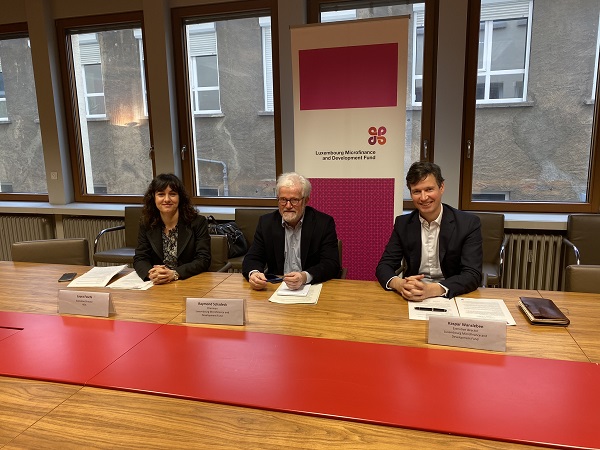 Press conference;
Credit: LMDF
Press conference;
Credit: LMDF
The Luxembourg Microfinance and Development Fund (LMDF) celebrated its 10th anniversary on Wednesday 11 March 2020.
Reflecting on the past decade, and the one to come, at a press conference earlier today, LMDF explained that it has provided support to more than 100 smaller microfinance institutions in 35 countries through over 160 investments to date. Over the next ten years, LMDF’s strategy is to actively accompany the transformation of the sector through digitaliation, small asset financing and value chains, as long as these solutions are beneficial for low-income entrepreneurs and households. For instance, LMDF is currently working with M-Kopa, a company financing solar powered electricity for low-income households living beyond the electricity grid.
LMDF was born in 2010 out of a joint initiative of the Luxembourg microfinance NGO ADA, the Cooperation and Finance Ministries and several banks in the Grand Duchy. The first projects in which the fund invested supported 13,000 micro-entrepreneurs in seven countries via a microfinance portfolio of €3.3 million.
Ten years later, over 230,000 entrepreneurs have been supported by LMDF, with 79% of those entrepreneurs residing in low- and middle-income countries where financial exclusion is rife. €74 million in financing has been provided to over 100 microfinance institutions over the fund’s history.
Taking private investors along this road has been one of the notable successes of the fund. For every €1 of public money invested at the start of LMDF, the private sector in Luxembourg has invested another €3 to date. Moreover, of the €30 million of private financing, about half comes from private individuals, foundations and NGOs. The array of partnerships with both the public and private sector has been critical to the fund’s success and LMDF is taking the 10th anniversary as an opportunity to thank all its partners.
Another factor which has contributed to LMDF's reputation over the years has been its strong social focus. The fund has always sought to work with institutions which are well placed to work with the most marginalised. Working with emerging microfinance institutions has allowed the fund to provide 77% of its financing to women and 60% to those in rural areas. LMDF has also introduced a detailed social performance analysis into all its investment files, ensuring that each institution with which it works balances social and financial performance. Every two years, the fund also provides a dedicated social impact report to its investors.
Looking to the future, in ten years’ time, the United Nations' (UN) sustainable development goals (SDGs) will expire and a lot of work remains to combat the core challenges facing the societies with which LMDF works, namely poverty, unequal access to opportunities of a globalised economy and limited financial inclusion and opportunities for formal work.
The concept of microfinance was to provide micro-entrepreneurs with the financing tools they need to improve their lives. In practice this means a concentration of small credits to finance short term needs, mostly of people living in and around the cities. Whereas this has provided a valuable tool in many regards, LMDF has maintained that the sector will need to evolve to respond to a broader set of financial needs of the poor.
As it celebrates its 10th anniversary, LMDF, together with ADA, is embarking on an innovative path on how to reach those not benefitting from microfinance in its present form. The identified areas of innovation are small asset financing (i.e. a solar panel or a motorbike), value chain finance (e.g. helping small farmers produce higher quality and access better markets) and assessing how finance can broaden access to quality education.
To celebrate both its birthday and its upcoming investment in Kenya, LMDF has planned a series of events during the month of May 2020. These events will focus on the fund’s achievements and the evolution of the microfinance industry going forward. A special guest from a Kenyan microfinance institution is expected to be present to explain these trends and the developments of the microfinance industry. These events will be announced on the website www.lmdf.lu and via social media.
LMDF Chairman Raymond Schadeck commented: "Microfinance has initiated its journey to becoming mainstream in retail investment as more and more individuals - and for example 67% of millennials - believe that their investment decisions are a way to express their social, political and environmental values!"
Kaspar Wansleben, Executive Director of LMDF, added: “Born out of a unique partnership between the Luxembourg State, the financial sector and civil society, LMDF played a valuable part in developing a more socially oriented microfinance sector in the last 10 years. Now it’s time for us to look forward and expand the notion of social finance in developing countries while offering many more citizens in Luxembourg the opportunity for a stable, high impact investment".









